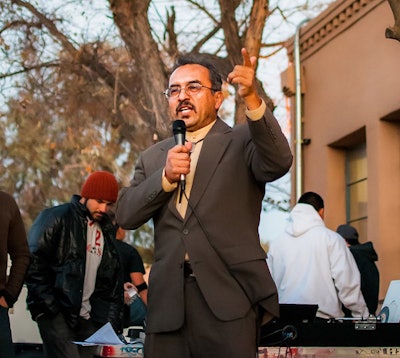Dr. Roberto 'Cintli' Rodriguez – award-winning Chicano activist, writer, and educator – died Monday, The Tucson Sentinel reported. Dr. Roberto Rodriguez
Dr. Roberto Rodriguez
Rodriguez, who was once a staff writer for Black Issues In Higher Education and later Diverse: Issues In Higher Education, died of heart failure in Teotihuacan, Mexico. He was 69.
“He was heroic,” said Patrisia Gonzales, Rodriguez’s colleague and wife. “He was someone really touched by destiny.”
A trained journalist and lecturer, Rodriguez authored four books and numerous essays, poems, and columns.
He was also a professor of Mexican American studies at the University of Arizona (UA). A staunch advocate for Mexican American studies classes in Arizona public schools, he was arrested for protesting the 2010 HB2281 ethnic studies ban.
“I always looked at SB1070 (a bill that required law enforcement to determine an individual’s immigration status during a routine stop) as a way to attack brown people, and that was a law to deport the body,” Rodriguez said in a 2014 interview. “HB2281 was to deport the mind and spirit.”
Born in Aguascalientes, Mexico, Rodriguez spent his career fighting brutality and writing about Chicano culture after Los Angeles officers assaulted and hospitalized him in 1979. One of his accomplishments is co-founding a database of killings of Latinos by law enforcement.
“His spirit would not allow him to stay quiet on an issue where he thought there was some wrong happening against people, especially people of color or anybody who might be brutalized for their differences,” said Gonzales, co-author of nationally syndicated column “Column of the Americas,” along with Rodriguez.
As a scholar, Rodriguez also researched maíz and its ties to the origins of Mexican culture.
“Roberto’s impact is expansive – the breadth of his knowledge is unmet. His research and role as a public intellectual created new paths, broke new ground,” UA associate professor of Mexican American studies Dr. Michelle Téllez wrote in an email. “Yet it is the work and commitment to his students that makes this loss so massive. He created personal relationships with his students and always demonstrated his willingness to go above and beyond for young people trying to understand themselves and their place in academia. He encouraged and inspired countless students.”















